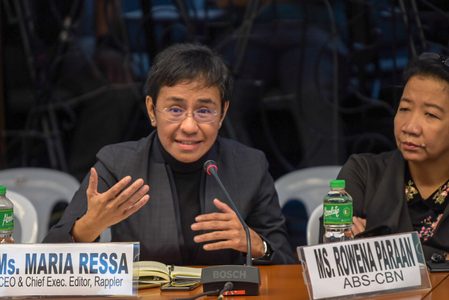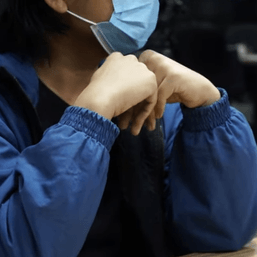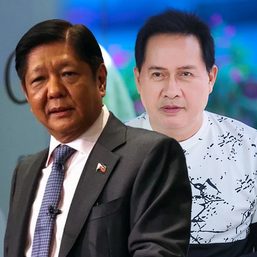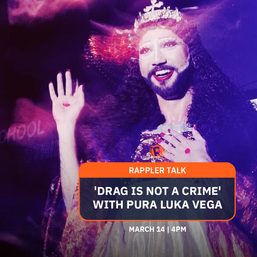SUMMARY
This is AI generated summarization, which may have errors. For context, always refer to the full article.
![[OPINION] Set me free, let me serve](https://www.rappler.com/tachyon/2022/02/SET-ME-FREE-LET-ME-SERVE.jpg)
After five years of unjust imprisonment, one question gets more and more frequently asked of me, especially as the 2022 elections loom nearer: why, despite all the controversies – of corruption, of abuses, of incompetence, of nepotism, of repression, of collusion with foreign enemies, and, generally, of being the anti-thesis to the ideals of a democratic government – are Duterte and his ilk continue to be popular?
This is inevitably followed by the question: do I still harbor hopes of regaining my freedom any time soon?
To the first, I would invariably answer that he and the rest of his brethren of 21st century despots are staying in power and, often, maintaining popular support because of what I refer to as the combined power of the Unholy Trinity of: (1) The Destructive Power of Disinformation, (2) The Chilling Effect of Reprisals, and (3) the Reverse Cargo Cult Mentality of the post-truth era, deployed on a global scale.
The destructive power of disinformation and the chilling effect of reprisals
In truth, these first two of the Triumvirate of Evil have been discussed extensively.
It was first reported, back in 2017-2018, that Duterte’s Presidential Communications Operations Office is sending its employees to China and Russia to undergo seminars and training on information dissemination, something that many, including now Nobel Laureate Maria Ressa, warned against as early as January 2018, as these two countries are known for controlling, even manipulating, media content.
In May 2018, it was confirmed by state-run Philippine News Agency that the Duterte government went ahead and sent a delegation of communications officials to receive training in Beijing. The move was not so surprising, but no less reprehensible, given the fact that this was preceded by an announcement in April 2018 that the Philippine government secured P140.8 million worth of aid from the Chinese government to “improve” the country’s state media.
The adverse effects of this questionable move would only continue to unfold in the years to come.
The 2020 report of Freedom House, entitled “Beijing’s Global Megaphone: The Expansion of Chinese Communist Party Media Influence since 2017,” noted that these trainings “serve as an avenue for the Chinese government to promote an alternative approach to journalism and news management that is not based on traditional democratic principles regarding press freedom.”
More importantly, the report showed that this is an anti-democratic project of a global scale. Citing a 2019 report by the Open Technology Fund, Freedom House noted that at least 75 countries had sent officials or reporters to China for trainings on journalism or information control over the past five years as of 2020.
But on the national level, the attack on press freedom and against defenders of democracy and human rights takes on a more precise nature. If disinformation is a machine gun designed for sustained direct fire with fully powered cartridges, the acts of reprisals against individuals considered to be “problematic” for the authoritarian regime is more of a sniper rifle strategically aimed at figureheads. The target may seem like a single individual, but the impact is meant to kill a movement, an idea.
The cases filed against Maria Ressa and Rappler are a prime example, and so is the experience of ABS-CBN, which showed that not even the largest broadcasting corporation is safe from having its franchise unceremoniously stripped, and its frequencies distributed as tokens to the administration’s close allies. The attacks may have seemed narrowly targeted, but the impact was intended to be felt by the entire fourth estate, creating a neutralizing and chilling effect that made media less effective in fighting disinformation.
The same goes with the acts of reprisal against Chief Justice Maria Lourdes Sereno who was unconstitutionally removed from her office. Her case served as the “stick” that loomed threateningly above, while the vacancy in the office of Chief Justice was repeatedly dangled as a “carrot” to members of the judiciary. The attack against her created a tremor that began the erosion of the independence of institutions that were supposed to keep the Executive in check, until we get to the point where people are even beginning to doubt the impartiality of the Commission on Elections.
![[OPINION] Set me free, let me serve](https://img.youtube.com/vi/xGCz8AS-_2o/sddefault.jpg)
‘Wag ka, made-De Lima ka (Be silent, or you’ll be De Lima-nized)
But before the attack against them, there was the consolidated, systematic, unrelenting, and uncivilized attacks against me, which gave rise to the term “De Lima-nization,” which is the three-step process that has since become the playbook of the Duterte cabal, later branching out from “drug-tagging” tactics to “red-tagging.”
During her testimony before the Philippine Senate in February 2018, Maria Ressa referred to this as “patriotic trolling” or “state-sponsored online hate and harassment campaigns [designed] to silence and intimidate.” At the time, she explained, to a room full of senators in a nationally broadcast Senate inquiry into “fake news,” that social media machinery has been weaponized against those targeted by the state by “flooding the market with lies and disinformation” that attack the credibility of a target by the use of even as few as 26 fake accounts, which are capable of influencing 3 million accounts to repeat a false allegation so many times that the truth has no chance of catching up.
Her testimony four years ago – informative, clear, and backed by research and data as it was – gave me my first real vindication and affirmation, when she openly stated that what was done to me was a meticulously orchestrated attack that had one goal: destroy my credibility.
Back in 2016, when one is on the receiving end of attacks such as those that I endured, there is a part of you that just cannot readily believe that this is now your reality. The combination of the extreme barbarism of the attacks and the fact that they are coming from the highest echelons of power leaves you with a sense of disbelief that this is really happening.
From public humiliation of hearing no less than the President of the Philippines on national television openly labeling me as the “mother of all drug lords” and a “bad woman,” vowing to “destroy me” and “end my political career,” and even urging me to go “hang myself,” to the rest of his minions in the legislative and executive branches subjecting me to misogynistic remarks, to openly un-parliamentarian conduct during congressional hearings, and even to a series of criminal and administrative cases left and right – there is a part of you that feels gaslit.
But the moment Maria Ressa broke down the whole process into three steps — first, allege corruption; second, sexualize the target; and, third, call for the arrest of the target — there was a sense of relief in having someone verbalize your experience from a third-party point of view.
Knowing is not solving
And yet, four years hence, little has changed. That Senate inquiry on fake news yielded nothing. I am still under detention. Social media is still pretty much unregulated and ever more influential, with many of the campaign process revolving around online platforms (a result, too, of the precautions necessitated by the pandemic).
My name is still falsely linked to the illegal drug trade.
And yet, to my bewilderment, going by recent surveys, those who have well-documented track records for corruption and for abusing their authority to the detriment of Filipino interests before and during the COVID-19 pandemic remain popular.
What gives? And what does that mean about my prospects for the future, as a person deprived of liberty and as a senatorial candidate? What explains this tendency of people to put their hopes and dreams in the hands of people that have betrayed them over and over again, and to so easily believe the lies told against people like me?
Does the pastillas scam in the Bureau of Immigration have no impact? What about the smuggling of illegal drugs with the complicity of Bureau of Customs officials? What about the Pharmally scandal? Guilty verdicts for tax evasion? The Sandiganbayan ordering an official to return to the national treasury P124 million worth of public funds that were siphoned to his account through the PDAF scam?
Is it all really just because of disinformation? Are we not giving too little credit to ordinary Filipinos, that we conclude that they cannot see what is right before their eyes?
The reverse cargo cult of Duterte and wannabe authoritarian regimes
Strangely, it is the brewing tension in Ukraine that gave me an idea of the missing piece of the puzzle, i.e., the idea of the “reverse cargo cult.”
Originally, the term “cargo cult” refers to the rituals that some indigenous groups perform to mimic what they perceived to be the rituals of more technologically advanced cultures that result in the latter receiving material goods (or “cargo”).
It is said that the term originated during the Second World War, when isolated and pre-industrial cultures witnessed the air-dropping of supplies (“cargo”) intended for allied military forces, which led them to conclude that elements like an airstrip and military uniform and drills are what triggered the arrival of the cargo. Thus, they made mock airstrips out of bales of straw, and imitated the behaviors of soldiers, hoping that cargo would again be dropped.
On the other hand, the so-called “reverse cargo cult” was coined by a Russian political analyst, Ekaterina Shulman, to describe a view held by the Russian political elite that attempts to justify the state of affairs in their society by promoting the belief that the alternative, i.e., the Western or developed world, is, in any case, in no better condition since their systems of democracy, freedom, and human rights are also merely just an illusion made up of manure and bales of straw.
This, then, is the horrifying possibility that we must deal with this coming May 2022 elections.
By vilifying personalities such as myself, Chief Justice Sereno, Maria Ressa, and the multitude of human rights defenders who have been red-tagged over the years, what if the Duterte administration has succeeded in turning the voters into reverse cargo cult believers?
What if the voters have been led to believe that the idea of a worthy candidate – who is competent, has integrity, and has real empathy for the Filipino interest – is just an illusion? One that if they allow themselves to believe in it, will result in a greater sense of betrayal and hurt once the betrayal comes to light?
What if the voters do know that Duterte and his ilk are, indeed, dirty, corrupt, abusive, and incompetent, but at least they don’t make any serious efforts to appear any better? That though they may make half-hearted attempts to claim innocence, in reality, they know that the people know it’s all just horseshit. And since the ordinary people are “in on the con,” they don’t feel as betrayed and, in fact, may even take some comfort and perhaps glee in being complicit in further cultivating the illusion?
What if they believe that all the candidates are crooks and they have, therefore, adopted the mentality of no longer choosing the “best” candidate based on qualifications, or even the “lesser of two evils,” but the “he may be a crook, but at least he doesn’t pretend to be any better, which makes him my choice of crook” approach?
Worse, what if Filipinos, after years and years of corruption and betrayals (real and perceived) have been led to believe that a government made of bales of straw and horse manure are all that they could hope for?
It truly disturbs me that the false accusations against me were only the first piece of horse manure that the Duterte administration produced in order to cultivate this reverse cargo cult mentality.
So I have become even more determined to fight for my innocence and, in so doing, destroy the illusion that everyone is as dirty and corrupt as Duterte and his minions.
No, not all candidates are crooks. There truly are worthy ones. More importantly, the Filipinos do deserve a real government, not a dirty cult-like one.
It is time to de-program those who believe in the lies that the Duterte regime has created.
This coming election, I think, that is the challenge for us who are not just bona fide candidates, but are bona fide public servants: to prove that the rewards of democracy, human rights, and the supremacy of the Rule of Law are not only real, but can be made to work for the benefit of the Filipino people.
So, to answer the second question that I am most frequently asked: yes, I still harbor hopes of regaining my freedom. I am ever more determined to fight for it, for how else can I best help demonstrate to the Filipino people the rewards that can be reaped from a government that is truly for the people?
Therefore, after five years of unjust detention, I am ever determined, ever unbowed, ever unbent, ever unbroken.
So my message to the Filipino people: set me free, and let me serve. – Rappler.com
Senator Leila de Lima, a fierce Duterte critic, has been detained in a facility at the Philippine National Police headquarters for several years over what she calls trumped-up drug charges.
Add a comment
How does this make you feel?

![[ANALYSIS] A generation that’s losing sleep over Marcos Jr.](https://www.rappler.com/tachyon/2022/02/generation-marcos-TL.jpg?fit=449%2C449)





There are no comments yet. Add your comment to start the conversation.